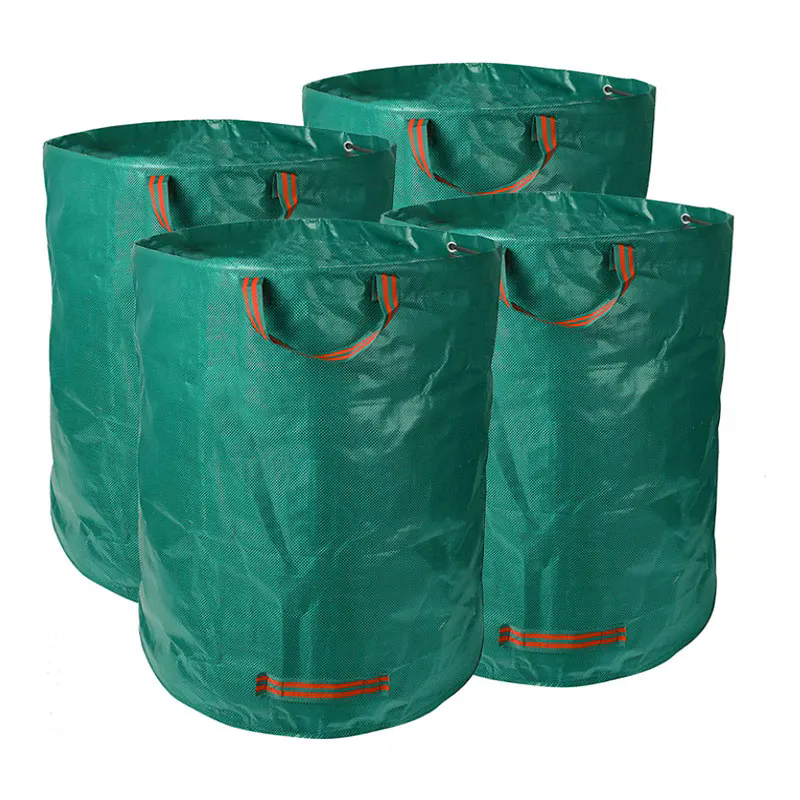The Benefits and Uses of Reusable Garden Waste Bags
2024-08-07
Garden maintenance and landscaping can generate a significant amount of waste, from grass clippings and leaves to pruned branches and plant debris. To manage this waste efficiently and sustainably, reusable garden waste bags have become a popular choice among gardeners and landscapers. In this blog, we'll explore the advantages of using reusable garden waste bags, their features, and how they contribute to environmentally friendly gardening practices.
1. What is a Reusable Garden Waste Bag?
A reusable garden waste bag is a durable, eco-friendly container designed for collecting and transporting garden waste. Unlike single-use plastic bags, these bags are made from materials that can withstand the rigors of garden work and are designed to be used multiple times. They come in various sizes and designs to suit different gardening needs.
Common Materials:
- Heavy-Duty Fabric: Often made from materials like canvas, woven polypropylene, or other sturdy fabrics that can hold up under heavy loads.
- Mesh: Some bags feature mesh panels for improved ventilation, helping to reduce odors and promote decomposition of organic waste.
- Plastic: Durable plastic versions are also available, designed to be lightweight and easy to clean.
2. Key Features of Reusable Garden Waste Bags
- Durability: Reusable garden waste bags are built to last, often featuring reinforced stitching, strong handles, and heavy-duty materials. This durability allows them to withstand the weight of garden waste and repeated use.
- Capacity: Available in various sizes, these bags can accommodate different volumes of waste, from small quantities of leaves to large amounts of branches and grass clippings.
- Ease of Use: Many garden waste bags are designed with features such as wide openings, easy-to-grip handles, and reinforced bottoms, making them easy to fill, carry, and empty.
- Collapsible Design: Some reusable garden waste bags are collapsible, allowing for easy storage when not in use. This feature is particularly useful for gardeners with limited storage space.
- Eco-Friendly: By opting for reusable bags, gardeners can reduce their reliance on single-use plastics, contributing to a decrease in plastic waste and promoting sustainable gardening practices.
3. Benefits of Using Reusable Garden Waste Bags
- Environmental Impact: Reusable garden waste bags help reduce the amount of single-use plastic that ends up in landfills or the environment. By choosing reusable options, gardeners can minimize their environmental footprint.
- Cost-Effective: Investing in reusable garden waste bags can be more cost-effective in the long run compared to continually purchasing disposable bags. The durability of these bags means they can be used season after season.
- Convenience: With features like handles and collapsible designs, reusable garden waste bags offer convenience in handling and storing garden waste. They make it easier to transport waste to composting bins, curbside collection points, or disposal sites.
- Versatility: These bags are versatile and can be used for a variety of garden tasks, including collecting leaves, clippings, and small branches. Some bags are even suitable for use in yard cleanups or transporting garden tools and supplies.
- Enhanced Composting: For gardeners who compost their green waste, reusable garden waste bags with mesh panels or ventilation features can aid in the decomposition process by allowing air circulation and reducing moisture build-up.
4. How to Choose the Right Reusable Garden Waste Bag
- Size and Capacity: Consider the size of your garden and the volume of waste you typically generate. Choose a bag size that meets your needs and allows for easy handling.
- Material: Select a material that suits your gardening conditions. For heavy or wet waste, a heavy-duty fabric or reinforced plastic bag may be preferable. For lighter waste, a mesh bag might suffice.
- Design Features: Look for features such as reinforced handles, wide openings, and collapsibility based on your preferences and storage needs.
- Ease of Cleaning: Choose a bag that is easy to clean, especially if you deal with wet or decomposing waste. Some materials can be hosed down or wiped clean, making maintenance simpler.
- Eco-Friendliness: Opt for bags made from recyclable or environmentally friendly materials to further enhance your sustainable gardening practices.
5. Tips for Using Reusable Garden Waste Bags
- Regular Cleaning: Clean your garden waste bags regularly to prevent odors and buildup. This will help maintain their durability and ensure they remain hygienic.
- Proper Storage: When not in use, store your bags in a dry place to prevent mildew or damage. Collapsible designs can help save space.
- Handling Heavy Loads: When dealing with heavy loads, be mindful of the bag's weight capacity to avoid overloading and potential damage. Distribute weight evenly to prevent strain on handles and seams.
- Composting: If using the bags for compostable waste, consider using bags with ventilation features to aid in the composting process.
Conclusion
Reusable garden waste bags are an essential tool for efficient and sustainable garden maintenance. With their durability, convenience, and environmental benefits, these bags provide a practical solution for managing garden waste while contributing to a greener planet. By choosing the right reusable garden waste bag for your needs, you can enhance your gardening practices, reduce plastic waste, and support a more eco-friendly lifestyle. Embrace the benefits of reusable garden waste bags and take a step towards more sustainable gardening practices today.



